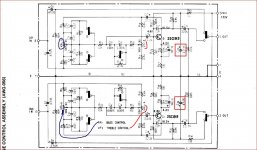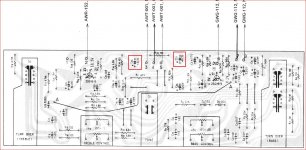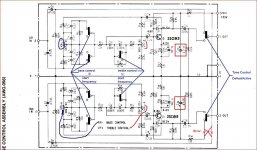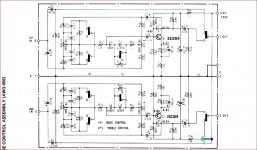Hi DIY'ers
I wonder if I can modify the tone control in my Pioneer SX-1080, by changing the value on some capacitors on the tone control board?
I've read a couple of places that the specs of the caps can enhance/reduce the amount of bass/treble an amp (pre-amp?) will let out, and also a while ago I watched a video on youtube where a guy had made a very simple curcuit that clearly demonstrated this correlation.
The reason I'm looking into this modification is, that I still miss the clarity and open airy sound this receiver used to be able to sound like. I have replaced ALL electrolytic caps, all trannys, many diodes and some resistors, on ALL boards, along with the protection- and soft start relays since it was beginning to sound rather dull and confined. I never really was satified with the result of the re-cap, and have been searching for that last thing that will make the difference and bring back the quality sound the baby once was capable of.
So if any one would care to comment on the idea (hopefully positive) I'd really appreciate it.
If I should give a guess, I would try and replace C23, C24 (47 µF) with ~30 µF caps, in order to enhance the treble.
What is the function of the low capacity caps of 0.02 ceramic and 0.0015 mylar caps? Will it influence tone level to replace them with other values?
I wonder if I can modify the tone control in my Pioneer SX-1080, by changing the value on some capacitors on the tone control board?
I've read a couple of places that the specs of the caps can enhance/reduce the amount of bass/treble an amp (pre-amp?) will let out, and also a while ago I watched a video on youtube where a guy had made a very simple curcuit that clearly demonstrated this correlation.
The reason I'm looking into this modification is, that I still miss the clarity and open airy sound this receiver used to be able to sound like. I have replaced ALL electrolytic caps, all trannys, many diodes and some resistors, on ALL boards, along with the protection- and soft start relays since it was beginning to sound rather dull and confined. I never really was satified with the result of the re-cap, and have been searching for that last thing that will make the difference and bring back the quality sound the baby once was capable of.
So if any one would care to comment on the idea (hopefully positive) I'd really appreciate it.
If I should give a guess, I would try and replace C23, C24 (47 µF) with ~30 µF caps, in order to enhance the treble.
What is the function of the low capacity caps of 0.02 ceramic and 0.0015 mylar caps? Will it influence tone level to replace them with other values?
Attachments
C23 and C24 are rail decoupling (power supply). All the small value (non electrolytic) caps on that diagram are related to setting the tone control characteristics.
Fist steps should be to test the amplifier with a signal generator and scope and make sure that the response is initially flat and that all the controls work as expected.
Replacing all that you have done leads the way open to possible mistakes having been done.
You need to test the amplifier in its present state and determine if in fact there is a problem before randomly changing parts in hope.
Fist steps should be to test the amplifier with a signal generator and scope and make sure that the response is initially flat and that all the controls work as expected.
Replacing all that you have done leads the way open to possible mistakes having been done.
You need to test the amplifier in its present state and determine if in fact there is a problem before randomly changing parts in hope.
Have the input selector and other switches in the signal path been cleaned?
Yes, I even took some of them apart to get into real depth. The tone pots was deoxed, and the turnover flip-switches was opened for a thorough cleaning.
(Not sure if this link will work?)
https://lh3.googleusercontent.com/-nxu_CaBMgw6YMDuDZQE9pZhxxHYBQTnX-f5R5zooeKuqxz6SxNkYdFj8zxN9RaUMaKgW4GsvVE4f_2Svoc3O9jprTc_GOumexZSeB2pusg3Q3HgJaZ640vJ7vAYmvcP7KZfF23THHW0BBQZNw6wNn7Lt7Yv9Vc34GD4MtCZWuxk9AHMm4OKZWUOmngB9XHGDp8-Mp6izBIR_eHU9tEv1eFp0urNp10jIaizFEgcYmBt2Q7Q2LwbLyWjT87BJvZMMnLE39rs4PuoJ4iSqBQ2vief6LVB0T8aaTlFPMi69ZFOKbbauuxPBI88CctzCOZj91XUtW-Su4xSe-ycIl1TGetehdr1kNlddmdEbHfg9pKh28hIS-nTzAzqgOJx1pzc-nhBux0bEop2991jUEs7h0iuZiGUPLUmt6XlY4ZtzFa6BBNPtzFeW1NJy_jEB4wE4q9NNodF0Sh7keu6P11f9Obld6zuGaLthOjoWQ4IiQ-3JsQ9W3bHQMBI9Tij7f2BroiTI6vgcTPB5QUSuumAuvu30CCpfqZN4Q9l9TjST9JP23kzITC0klceXYOinDm2BgV06zL9rk_C6ClBjFtZ3PEIQrog4BNSKrohBcYwLMy64dp6=w1482-h988-no
does it have a TA7136p feeding the tone circuit? if so replace it with LM4560 or opa 2134
tone on 780 feeds amp directly, this has a transistor providing additional gain
replace the 100/10 cap with 100/25 or 220/25
my pioneer SX-780
1. 300 VA transformer
2. regulated VAS stage for Amp with separate transformer winding
3. amp very close to Honey Badger design
4. 7.5 v for display lamps can run 6922 heater
5. A very good looking unit to display
** A sx 780 can be had on ebay for $200 ( less then a blank case & heat sink)
add 6922 tube preamp for TA7136P ( really can't explain why this is sooo good )
add 22000/50v main filter caps
add 1000/63 v for VAS stage regulator
boost VAS stage regulator voltage from 40 to 45v for mosfets
add double zener regulation to +- 24 volt supplies
add 18v regulator where resistor is mounted on heat sink
Add IRFP9240 & IRFP240 mosfet outputs instead of STK0050II
use phono section to equalize and smooth ipod signal level
properly done the Amp s/n > 100db amp THD 0.003 % bias at 100MA
measured from amp input. Tube distortion .6 - 1.5%
should cause a run on SX 780's as this unit is really easy to work on
tone on 780 feeds amp directly, this has a transistor providing additional gain
replace the 100/10 cap with 100/25 or 220/25
my pioneer SX-780
1. 300 VA transformer
2. regulated VAS stage for Amp with separate transformer winding
3. amp very close to Honey Badger design
4. 7.5 v for display lamps can run 6922 heater
5. A very good looking unit to display
** A sx 780 can be had on ebay for $200 ( less then a blank case & heat sink)
add 6922 tube preamp for TA7136P ( really can't explain why this is sooo good )
add 22000/50v main filter caps
add 1000/63 v for VAS stage regulator
boost VAS stage regulator voltage from 40 to 45v for mosfets
add double zener regulation to +- 24 volt supplies
add 18v regulator where resistor is mounted on heat sink
Add IRFP9240 & IRFP240 mosfet outputs instead of STK0050II
use phono section to equalize and smooth ipod signal level
properly done the Amp s/n > 100db amp THD 0.003 % bias at 100MA
measured from amp input. Tube distortion .6 - 1.5%
should cause a run on SX 780's as this unit is really easy to work on
Last edited:
changing any of the low value caps to other values will completely change the tone flavor as well as the center position flatness. c17 and c21 affect the bass response and 2sc1919 gain.
What drives the tone control stack? line or preamp?
do both channels sound dull? if not a bad resistor in amp may be the problem.
What drives the tone control stack? line or preamp?
do both channels sound dull? if not a bad resistor in amp may be the problem.
Last edited:
OK won't touch those, thenC23 and C24 are rail decoupling (power supply).
OK, so these I can play with.All the small value (non electrolytic) caps on that diagram are related to setting the tone control characteristics.
True, but I'm not too well equipped, or have the much experience here. I do have a PC software-USB osciloscope that can help a little, but it's not very good.Fist steps should be to test the amplifier with a signal generator and scope and make sure that the response is initially flat and that all the controls work as expected.
True, but I was very thorough and double & triple checked.Replacing all that you have done leads the way open to possible mistakes having been done.
Well, I wouldn't know how, other than checking voltagesYou need to test the amplifier in its present state and determine if in fact there is a problem before randomly changing parts in hope.
From what you tell, I suppose I could experiment replaceing the low value ceramic and/or mylar caps, and see if it changes to my preferences ?
You can create a nice frequency sweep using Audacity and either burn it to CDR or just export it as a WAV or MP3 file. A USB scope should be useable over the audio band. You can easily check that by monitoring the output from a CD player playing the sweep. It should be constant in amplitude. Make the sweep slow, say over 2 minutes.
http://www.diyaudio.com/forums/soft...ing-using-audacity-get-you-started-guide.html
http://www.diyaudio.com/forums/soft...ing-using-audacity-get-you-started-guide.html
Ultraspark,
before starting to swap any components you should try to figure out the current status of the amplifier section with tone controls defeated - the easiest way would be to use RMAA.
If the figures and graphs look reasonable then you should try to measure the frequency response with treble in max position.
One of my amplifiers also sounded "veiled" and "dull" (compared to others) and I found out that the highs started to elevate only from 2kHz upwards while my "reference amp" started to elevate them already from 1kHz.
Ok, installed LTspice, found some tone control models from the net, spent some hours on learning my way around and found the cap to change (from 39nF to 100nF it went). As a result the "shine" is back in the sound, the elevation starts from ca 800Hz and is ca 3dB (compared to base level) at 3kHz. Certainly I can put the knob in the neutral position and have flat response ;-).
before starting to swap any components you should try to figure out the current status of the amplifier section with tone controls defeated - the easiest way would be to use RMAA.
If the figures and graphs look reasonable then you should try to measure the frequency response with treble in max position.
One of my amplifiers also sounded "veiled" and "dull" (compared to others) and I found out that the highs started to elevate only from 2kHz upwards while my "reference amp" started to elevate them already from 1kHz.
Ok, installed LTspice, found some tone control models from the net, spent some hours on learning my way around and found the cap to change (from 39nF to 100nF it went). As a result the "shine" is back in the sound, the elevation starts from ca 800Hz and is ca 3dB (compared to base level) at 3kHz. Certainly I can put the knob in the neutral position and have flat response ;-).
No TA716p present anywhere.does it have a TA7136p feeding the tone circuit? if so replace it with LM4560 or opa 2134
tone on 780 feeds amp directly, this has a transistor providing additional gain
replace the 100/10 cap with 100/25 or 220/25
my pioneer SX-780
1. 300 VA transformer
2. regulated VAS stage for Amp with separate transformer winding
3. amp very close to Honey Badger design
4. 7.5 v for display lamps can run 6922 heater
5. A very good looking unit to display
** A sx 780 can be had on ebay for $200 ( less then a blank case & heat sink)
add 6922 tube preamp for TA7136P ( really can't explain why this is sooo good )
add 22000/50v main filter caps
add 1000/63 v for VAS stage regulator
boost VAS stage regulator voltage from 40 to 45v for mosfets
add double zener regulation to +- 24 volt supplies
add 18v regulator where resistor is mounted on heat sink
Add IRFP9240 & IRFP240 mosfet outputs instead of STK0050II
use phono section to equalize and smooth ipod signal level
properly done the Amp s/n > 100db amp THD 0.003 % bias at 100MA
measured from amp input. Tube distortion .6 - 1.5%
should cause a run on SX 780's as this unit is really easy to work on
Thanks for the recipe, but it will be too extensive for me, and not really what I'm looking for.
I have a working unit, that I would like to try and tweak, if it isn't just plain stupid to do

OK, this is what I'm trying to play with. Could it make sense to find a replacement for 2SC1919 laterchanging any of the low value caps to other values will completely change the tone flavor as well as the center position flatness. c17 and c21 affect the bass response and 2sc1919 gain.
LineWhat drives the tone control stack? line or preamp?
Yes, both.do both channels sound dull? if not a bad resistor in amp may be the problem.
It just de-activates the tone controls and passes the un-modified signal. When the tone defeat switch is on, theres no effect to the bass & treble pots....(I'm sure you know that)Since there is a switch to defeat the tone control, seems easy to find out if the problem comes from there 😎
But perhaps the schematic is not what's in the amp, found allready an error 🙁
Mona
That's a pretty sharp observation
 on the diagram - now I see it too
on the diagram - now I see it tooAttachments
There are several parts either not installed or of different values in the SX-780
however this will not explain the lack of an open airy sound as it had it before.
KSC1885 could replace 2SC1919 but I doubt that is the problem.
it is easy to tell as the tone defeat switch switches out the tone circuit entirely.
to electrically remove the circuit, input capacitor C1 (4.7/25) can be removed from 1 channel and test. if no difference then 2SC1919 is ok
however this will not explain the lack of an open airy sound as it had it before.
KSC1885 could replace 2SC1919 but I doubt that is the problem.
it is easy to tell as the tone defeat switch switches out the tone circuit entirely.
to electrically remove the circuit, input capacitor C1 (4.7/25) can be removed from 1 channel and test. if no difference then 2SC1919 is ok
there is another 2 transistor preamp in front of the volume control, you can replace both electrolytic capacitors for each channel. c14 c18 c13 c19
Check these numbers first as the schematic a got is fuzzy
Check these numbers first as the schematic a got is fuzzy
- Status
- Not open for further replies.
- Home
- Amplifiers
- Solid State
- Modify tone control on Pioneer SX-1080



